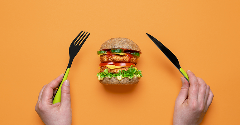News
Rabobank foresees structural change in food supply chain
26 Feb 2015Lack of growth, price pressure from food retailers and changing consumer behaviour are all creating a challenging environment for the foods sector, according to a new report from Rabobank. New technologies and innovations such as 3D printed food, algae and insects as a form of protein, wearable technology and smart shopping tools have the potential […]

 Lack of growth, price pressure from food retailers and changing consumer behaviour are all creating a challenging environment for the foods sector, according to a new report from Rabobank. New technologies and innovations such as 3D printed food, algae and insects as a form of protein, wearable technology and smart shopping tools have the potential to structurally change the food supply chain in the very near future.
Lack of growth, price pressure from food retailers and changing consumer behaviour are all creating a challenging environment for the foods sector, according to a new report from Rabobank. New technologies and innovations such as 3D printed food, algae and insects as a form of protein, wearable technology and smart shopping tools have the potential to structurally change the food supply chain in the very near future.
In the context of three mind-sets of the dynamic consumer – sustainability, convenience and health – Rabobank has gauged the viability and timing of a selection of innovations in its report; ‘What’s Cooking in Tomorrow’s Kitchen’ that are the cusp of breaking through and have the ability to drastically change the market.
“Traditionally static consumption patterns have undergone a transformation and we believe there are now three prevalent consumer mind-sets for food buying: sustainability, convenience and health,” said Rabobank analyst Jelle Groot. “Understanding these mind-sets and using appropriate innovations could not only have a game-changing effect on food processors’ businesses, but will be essential to remain relevant in a highly competitive environment.”
For consumers with a sustainable mind-set, alternative ingredients may replace existing ones. In the face of a growing global population and limited natural resources, alternative ingredients that are more environmentally friendly – such as macro-algae (seaweed), micro-algae and insects as a form of protein, are promising. However, adoption may take time as challenges lie in scale, cost competitiveness and consumer acceptance. Significant research and development, marketing and promotional efforts by food companies will be required to develop products with these novel ingredients at a price level consumers will pay.
The convenience trend centres on reducing consumers’ time, effort and energy. Over the next two decades, online food shopping will continue to grow and inside stores, new technologies will enable retailers to deliver an augmented shopping experience, helping companies engage with customers through personalised offers and product suggestions to fit with diet and lifestyle.
Those consumers with a health mind-set want to increasingly understand what their bodies need, and eat accordingly. Wearable technology and self-tracking apps are already in the market to help consumers ‘quantify’ and track data on their lives, including calories consumed.
New technologies in this category will facilitate personalised diets and customised food. This will include 3D printed food which can be personalised with respect to nutritional values and ingredients, as well as flavour, texture and size. Hand-held food scanners allowing users to get the nutritional values of food also looks set to rise in popularity. However, this will lead to food companies being challenged to deliver more consistent quality.
Predicting the future is impossible, notes Rabobank, but technologies such as wearable devices and smart shopping tools are already changing consumer mind-sets and demands. Playing into these trends comes at a cost, and while the results are uncertain, using innovations that tap into consumer megatrends can help processors find those much sought-after pockets of growth.
Related news

Has ‘clean’ had its day?
22 Dec 2025
Wielding clean-label positioning and fortification as marketing levers is a dangerous strategy, and brands would be better off explaining the hows and whys of the ingredients in their products, say experts.
Read more
Celebrating the winners of the Fi Europe Innovation Awards 2025
3 Dec 2025
Food industry stakeholders celebrated as the winners of the Fi Europe Innovation Awards were announced at a ceremony in Paris.
Read more
Alternative protein startups pivot to B2B ingredients amid funding shift
27 Nov 2025
Alt protein startups are pivoting from consumer meat analogues to high-value B2B ingredients, driven by stronger investor interest, better margins, and clearer commercial pathways.
Read more
Walmart Marketplace’s record growth prompts search for UK sellers
26 Sep 2025
Walmart’s third-party e-commerce platform, Marketplace, has witnessed extraordinary growth – but a need for more product diversity has prompted the retailer to recruit UK sellers.
Read more
The winners of Vitafoods Europe Startup Challenge 2025 revealed
29 May 2025
Four startups – Yomio Drops, PFx Biotech, Revobiom, and Favamole – took top prizes at this year’s Vitafoods Europe Startup Challenge awards.
Read more
East takes on West in the fight for future food flavours
30 Apr 2025
Asian and South American flavours are now key components on global menus, driven by a growing global appetite for culinary mashups.
Read more
Food companies urged to bring ‘joy’ and urgency to healthy food mission
14 Mar 2025
For too long, businesses have treated health and sustainability as separate agendas – but there is growing evidence to show diets that benefit human health can also enhance that of the planet, say experts.
Read more
Entries open for inaugural Vitafoods Europe Innovation Awards
29 Jan 2025
Entries are open for the inaugural Vitafoods Europe Innovation Awards, celebrating the ingredients, finished products, partnerships, and initiatives redefining the nutraceutical landscape.
Read more
Paris Olympics: Food and beverage brands champion health, fun, and sustainability
5 Aug 2024
Food and beverage brands are aligning with the Paris Olympics 2024 Food Vision, which emphasises sustainability, local sourcing, and plant-based diets.
Read more
Natural Remedies: Bringing health and happiness via validated branded ingredients
18 Apr 2024
Natural Remedies is an internationally renowned botanical healthcare company committed to advancing the field through rigorous research and the development of clinically validated Branded Ingredients. Guided by our foundational principle of ‘BEING USEF...
Read more